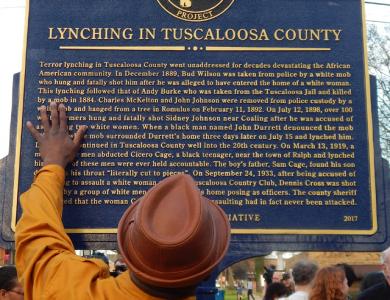According to Montgomery, Alabama’s Equal Justice Initiative,”the death penalty in America is a failed, expensive policy defined by bias and error.”
 Quoting directly from the EJI.org website: “It is a direct descendant of lynching. More than eight in ten American lynchings between 1889 and 1918 occurred in the South, and more than eight in ten of the more than 1400 executions carried out in this country since 1976 have been in the South. Modern death sentences are disproportionately meted out to African Americans accused of crimes against white victims. African Americans make up less than 13 percent of the nation’s population, but 42 percent of the 2905 people currently on death row are black, and 35 percent of those executed since 1976 have been black. The victim was white in over 75 percent of the cases resulting in execution since 1976, although only 50 percent of murder victims nationwide are white. The chief prosecutors in death penalty states are overwhelmingly white; only about one percent are black.
Quoting directly from the EJI.org website: “It is a direct descendant of lynching. More than eight in ten American lynchings between 1889 and 1918 occurred in the South, and more than eight in ten of the more than 1400 executions carried out in this country since 1976 have been in the South. Modern death sentences are disproportionately meted out to African Americans accused of crimes against white victims. African Americans make up less than 13 percent of the nation’s population, but 42 percent of the 2905 people currently on death row are black, and 35 percent of those executed since 1976 have been black. The victim was white in over 75 percent of the cases resulting in execution since 1976, although only 50 percent of murder victims nationwide are white. The chief prosecutors in death penalty states are overwhelmingly white; only about one percent are black.
Mounting evidence shows that innocent people have been sentenced to death and that serious legal errors infect the administration of capital punishment: 156 people have been exonerated and released from death row. For every nine people executed in this country, one innocent person on death row has been identified and exonerated. In response to growing concerns about reliability, many states have suspended executions or experienced a decline in the use of capital punishment, but most Southern states have continued to condemn and execute large numbers of people who disproportionately are poor and racial minorities.
Policymakers are increasingly recognizing the death penalty as a prohibitively expensive policy that does not contribute to public safety. The evidence is clear that executions do not lower homicide rates; indeed, the South has the nation’s highest murder rate despite carrying out 81 percent of executions. (The Northeast, which has less than 1 percent of all executions, has the lowest murder rate.) Executions cost millions of dollars more than imposing life sentences, and polls show that a majority of Americans prefer life over death sentences. Seven states have abolished the death penalty since 2007, the governors in four states have halted executions, and the death sentencing rate has dropped dramatically from 277 death sentences imposed in 1999 to just 49 in 2015 nationwide.”
The Equal Justice Initiative (EJI) was founded in 1994 in Montgomery, Alabama, by attorney Bryan Stevenson, who has served as the organization’s executive director ever since.[1] He had been working on Alabama defense cases since 1989 for the Southern Center for Human Rights and was director of its center for Alabama operations. It had received federal funding to provide legal representation to prisoners on death row. In 1994, after Republicans gained control of Congress in a mid-term election, they ceased funding such centers. Alabama is the only state that does not provide legal assistance to death row prisoners; EJI has committed to representing them.[1]
In April 2015, EJI won the release on different grounds of Anthony Ray Hinton, a black man who had been on death row in Alabama for nearly 30 years; he had continued to maintain his innocence. He was released after being wrongfully convicted of murder due to inadequate counsel and faulty evidence. He had finally gained a new trial on appeal, as the defense found flaws in the main evidence used by the prosecution. In preparation for trial, the prosecution found that the bullets used in the crime did not match the gun they had traced to Hinton’s home. There was no case, and the state dropped the charges.[5]
As of August 2016, the EJI organization has saved 125 men from the death penalty.[6][7]

George Will is a nationally known columnist for the Washington Post and a TV commentator and personality. Wills’ following Sept. 28 column appeared in the Washington Post:
“WASHINGTON — Without being aware of it, Vernon Madison might become a footnote in constitutional law because he is barely aware of anything. For more than 30 years, Alabama, with a tenacity that deserves a better cause, has been trying to execute him for the crime he certainly committed, the 1985 murder of a police officer. Twice the state convicted him unconstitutionally (first excluding African-Americans from the jury, then insinuating inadmissible evidence into the record). In a third trial the judge, who during his time on the bench overrode more life sentences (six) than any other Alabama judge, disregarded the jury’s recommended sentence of life imprisonment and imposed the death penalty.
The mills of justice grind especially slowly regarding capital punishment, which courts have enveloped in labyrinthine legal protocols. As the mills have ground on, life has ground Madison, 68, down to wreckage. After multiple serious strokes, he has vascular dementia, an irreversible and progressive degenerative disease. He also is legally blind, his speech is slurred, he has Type 2 diabetes and chronic hypertension, he cannot walk unassisted, he has dead brain tissue and urinary incontinence.
And he no longer remembers the crime that put him on death row for most of his adult life. This is why on Tuesday the Supreme Court will hear oral arguments about the constitutionality of executing him.
His counsel of record, Bryan A. Stevenson, head of the Equal Justice Initiative in Montgomery, Alabama, says that it was undisputed in the penalty phase of Madison’s third trial that he already “suffered from a mental illness marked by paranoid delusions.” Stevenson says that Madison, who has been mentally ill since adolescence and who over the years had been prescribed “numerous psychotropic medications,” cannot remember “numerous events” of the past 30 years, including “events from the offense to his arrest or to his trial,” and cannot remember the name of the police officer he shot.
The mere phrasing of the matter at issue — whether Madison is “competent to be executed” — induces moral vertigo. A unanimous three-judge panel of the 11th U.S. Circuit Court of Appeals held that Madison lacks the requisite competence because he lacks understanding of the connection between his crime and his execution. The question before the Supreme Court is whether executing Madison would violate the Eighth Amendment’s proscription of “cruel and unusual punishments.”
The court has said that “we may seriously question the retributive value of executing a person who has no comprehension of why he has been singled out and stripped of his fundamental right to life.” For many people, the death penalty for especially heinous crimes satisfies a sense of moral symmetry. Retribution — society’s cathartic expression of a proportional response to attacks on its norms — is not, however, the only justification offered for capital punishment. Deterrence is another. But by now this power is vanishingly small because imposition of the death penalty is so sporadic and glacial. Because the process of getting from sentencing to execution is so protracted, currently averaging 15 years, senescent persons on the nation’s death rows are going to be problems as long as there is capital punishment.
Madison’s case compels us to focus on the death penalty in its granular reality: Assisting someone who is non-ambulatory, and bewildered because he is (in Stevenson’s phrase) “memory-disordered,” to be strapped down so an executioner can try to find a vein — often a problem with the elderly — to receive a lethal injection. Capital punishment is withering away because the process of litigating the administration of it is so expensive, and hence disproportionate to any demonstrable enhancement of public safety, but also because of a healthy squeamishness that speaks well of us.
Sixty years ago, Chief Justice Earl Warren wrote that the Eighth Amendment — particularly the idea of what counts as “cruel” punishments — “must draw its meaning from the evolving standards of decency that mark the progress of a maturing society.” Concerning which, two caveats are apposite: “evolving” is not a synonym for “improving,” and a society can become, as America arguably is becoming, infantilized as it “matures.” That said, it certainly is true that standards of decency do evolve, and that America’s have improved astonishingly since 1958: Think about segregated lunch counters, and much else.
Conservatives have their own standards, including this one: The state — government — already is altogether too full of itself, and investing it with the power to inflict death on anyone exacerbates its sense of majesty and delusions of adequacy.”
In this Country we often think we have a fair and equitable justice system. We are often wrong. According to statistics from EJI our prisons are filled with wrongfully convicted and sentenced to death row inmates. EJI has been responsible for getting at least 156 death sentences overturned and prisoners released from death row. Based on bad convictions. If these facts are accurate that is breathtaking and absolutely stunning. How many men (or women) have been executed that were wrongfully convicted? We will never know.
For this writer, the death penalty should be eliminated. We should never again, in this country, run the risk of wrongful conviction and execution of any person and certainly not the execution of a mentally incompetent or impaired defendant. Better that the taxpayer should bear the expense of lifetime incarceration than the burden of executing an innocent human.
The U.S. Supreme Court will hear oral argument on the Vernon Madison case on Tuesday, October 2.

For more analysis on the death penalty the following additional links are provided for the thoughtful reader:
Laurence H. Tribe: The Supreme Court should strike down the death penalty
Richard Cohen: Why haven’t we abolished the death penalty and moved on?
Elizabeth Bruenig: The pope’s death penalty announcement reminds us what is pure and holy
Bob Taft and Joseph E. Kernan: End the death penalty for mentally ill criminals
Charles Lane: Most Americans don’t like the death penalty, right? Wrong.
“>












[…] For more information and opinion on the Death Penalty and the Equal Justice Initiative look to The Bibb Voice article that appears at this link. […]